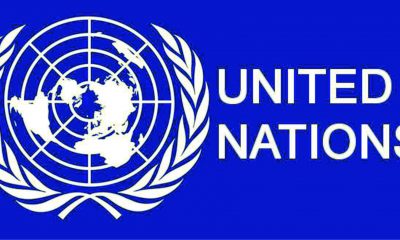Agriculture
Wheat Price Up By 50% As Import Falls
The price of durum wheat has risen by 50 per cent since the beginning of 2022 and its importation has fallen by 16.09 per cent.
This is due to the global scarcity of wheat caused by the Russian-Ukraine and the lack of foreign exchange in the nation.
Speaking to The Tide source, the National Public Relations Officer, National Wheat Farmers, Processors and Marketers Association of Nigeria, Tola Ogunnubi, said, “Before the war, it was selling for N27,000 to N28,000 for 100kg, it is N41,000 to N42,000 now”.
The importation of durum wheat into Nigeria crashed by 16.09 per cent year-on-year in the first nine months of 2022.
According to data from the National Bureau of Statistics (NBS), the total importation of durum wheat into Nigeria was N753.59bn in the first three quarters of 2022, a N144.59bn fall from the N898.19bn it was in the corresponding period of 2021.
Based on the NBS, durum wheat is the major agricultural import into Nigeria.
“The major agriculture goods imported in Q1, 2022 included Durum wheat (not in seeds), from the United States with N71.56bn and Argentina with N59.04bn.
“The major agriculture goods imported in Q2, 2022 included ‘Durum wheat (not in seeds)’ from the United States of America with N70.67bn and Lithuania with N60.87bn. The major agriculture goods imported in Q3, 2022 included ‘Durum wheat (not in seeds)’ from the United States of America with N78.29bn, and Poland with N45.62bn.
“Wheat, which serves as flour, is essential in the production of pasta, bread, noodles, and other food items. The fall in wheat importation which the nation is heavily dependent upon has translated to higher prices for most of these food items”, the NBS said.
Ogunnubi further said, “Wheat importation is decreasing but it doesn’t mean that we have achieved wheat sufficiency as such. We have wheat still retaining the third position in terms of commodities that engulf the highest FX. It is after refined petrol products and gas.
“Wheat is still the third highest and we are looking at a situation where we have wheat sufficiency just as we’ve had in rice.
“We are looking forward to the government encouraging wheat farming, and production. We are imploring the government to come into the entire value chain of wheat production. From planting processing, distribution, everything across the full value chain.”
“Wheat is fast becoming a staple food. If people are not eating maize, they are eating bread, flour, spaghetti, which are some of the side products from wheat. So why are they not sufficient?
“The crisis in Russia and Ukraine is affecting importation but that does not mean there are no other markets for importation. The durum wheat that we tend to process in Nigeria can be sourced from Mexico. It is not as if people are not looking in that direction, but the CBN is not giving foreign exchange. The CBN is not giving FX for wheat importation.”
Agriculture
FG, Ogun Distribute Inputs To 2,400 Farmers
Federal Government and the Ogun State Government, on Wednesday, distributed farm inputs to farmers as part of effort to address food security challenge.
The State Director, Federal Ministry of Agriculture and Food Security, Dr. Toyin Ayo-Ajayi, during the flag-off ceremony of Inputs Redemption Under The National Agricultural Growth Scheme-Agro Pocket (NAGS-AP), in Ogun State, disclosed that beneficiaries of the gesture were primarily rice, maize and cassava farmers across the State.
Ayo-Ajayi commended the Ogun State Government for partnering with the government at the centre for the effort in supporting farmers with inputs that would bring about yieldings for local consumption and likely exportation.
She noted that government is supporting rice, cassava and maize farmers with inputs worth N212,000; N189,000 and N186,000 respectively.
The Permanent Secretary in the State Ministry of Agriculture, Mrs Kehinde Jokotoye, who represented the Commissioner in the Ministry, Bolu Owotomo, stated that traditional farmers are critical in food production, hence the need to encourage and support them with inputs that would bring about desired results during harvesting.
Owotomo said: “Let us make good use of this opportunity, so that the success of this phase will make farmers benefit more from the state and federal governments of Nigeria.”
Earlier, State Coordinator, Federal Ministry of Agriculture and Food Security, Dr. Oluwatoyin Ayo-Ajayi, appreciated the present administration for partnering with the federal government for the initiative, adding that the programme is designed to support farmers at the grassroots level in cassava, rice and maize with inputs such as, seeds, pesticides, herbicides and fertilizers, to boost their production and enhance their livelihood.
Agriculture
Niger Allocates 10,000 Hectares For Smallholder Farmers
The Niger State Government has mapped out 10,000 hectares of farmland in Gbapo Community of Katcha Local Government Area of the State for smallholder farmers to benefit from the state government’s agricultural intervention programme.
Two thousand out of the 10,000 holders of the farmlands have already received inputs.
At a flag-off ceremony in Yinti Village, the facilitator of the programme, Shinkafan Nupe, Malam Idris Usman Makanta, assured the farmers of increased distributions to the mapped-out ten thousand (10,000) farmlands if farmers respond positively.
He explained that the commencement of the two thousand is to measure the positive response of farmers before obtaining full-scale support.
Malam Makanta stated that this initiative aligns with the farmers’ initial commitment through Niger Foods, whose mission is primarily geared towards establishing efficient and profitable agricultural businesses to support the present administration of Governor Mohammed Umaru Bago’s quest to boost agricultural productivity in the state.
He also commended Niger Foods for their steadfastness and resilience in the effective implementation of the input financing scheme.
Makanta reiterated the commitment of the State Governor in making judicious use of the arable land in the state.
Shinkafan Nupe, therefore, urged the farmers to support the Governor by using the inputs wisely so that the dream can be actualised.
Agriculture
GO-CARES: Gombe Empowers 573,429 Farmers, Entrepreneurs
The Gombe State Government has empowered a total of 573,429 farmers and entrepreneurs under the 4th phase of the GO-CARES programme.
The programme was officially flagged off by Governor Inuwa Yahaya in another major step towards alleviating poverty and supporting the state’s vulnerable populations.
The Governor, while inaugurating the disbursement in Akko Community of Akko Local Government Area, restated his administration’s commitment to the welfare of vulnerable citizens in the state.
He was represented by the Commissioner for Budget and Economic Planning, Salihu Baba Alkali, who is also the Chairman of the Steering Committee on GO- CARES implementation.
“The 4th phase of GO-CARES will directly and indirectly impact a total of 573,429 citizens across the state. Of these, 152,429 individuals will benefit directly through cash transfers, livelihood grants, agricultural inputs, and operational grants to small businesses”, he stated.
The Governor added that, “421,000 people will be indirect beneficiaries through infrastructural projects such as classroom blocks, healthcare facilities, WASH services, and rural infrastructure projects like culverts and drainages”.
Yahaya, reaffirmed his commitment to ensuring that the state’s most vulnerable citizens are not left behind in the state’s development.
According to him, “Earlier this year, on June 25, 2024, we flagged off the distribution of improved seedlings, fertilizers, and herbicides to less privileged farmers in Malam Sidi, Kwami Local Government Area, signaling the commencement of the 4th phase implementation of GO-CARES under Result Area 2”.
The Governor reiterated that these initiatives have had a significant impact on the livelihoods of beneficiaries and the overall agricultural sector.
He explained that, “Today’s ceremony marked the simultaneous launch of activities under all three GO-CARES Result Areas for the 4th phase. These areas include: State Cash Transfer Grants: 2,500 direct beneficiaries; Labour Intensive Public Works: 2,700 direct beneficiaries; Livelihood Grants: 10,000 direct beneficiaries; and Basic Services: 405,000 indirect beneficiaries”.
-
News5 days ago
MAN Warns Against Further Hike In Electricity Tariff
-
Sports5 days ago
W’Cup: Eagles Get Dates for Rwanda, Zimbabwe Qualifiers
-

 News2 days ago
News2 days ago27 Lawmakers: NCSU Alerts On Wike’s Plot To Pervert Justice
-

 News2 days ago
News2 days agoSERAP Sues Tinubu Over Unexecuted N167bn Projects
-

 News5 days ago
News5 days agoWFP Votes $2.5bn To Fight Hunger, Malnutrition In Nigeria
-

 Editorial5 days ago
Editorial5 days agoHIV, Transiting From Donor Dependence
-

 Politics2 days ago
Politics2 days agoPDP Stalwart Canvases Support For PHALGA Mayor
-
Education2 days ago
LG Boss Inaugurates 11-Man Scholarship Board

